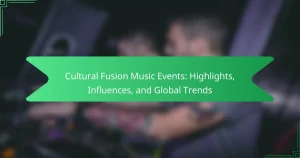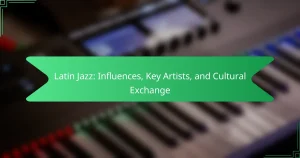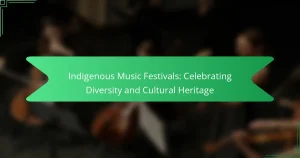Reggae and hip-hop serve as powerful platforms for cultural identity and social expression. They explore themes of resistance, identity, and social justice while fostering global connections. Artists blend these genres to create innovative sounds, utilising technology for collaboration and distribution. This musical fusion promotes understanding and appreciation of diverse cultural narratives.
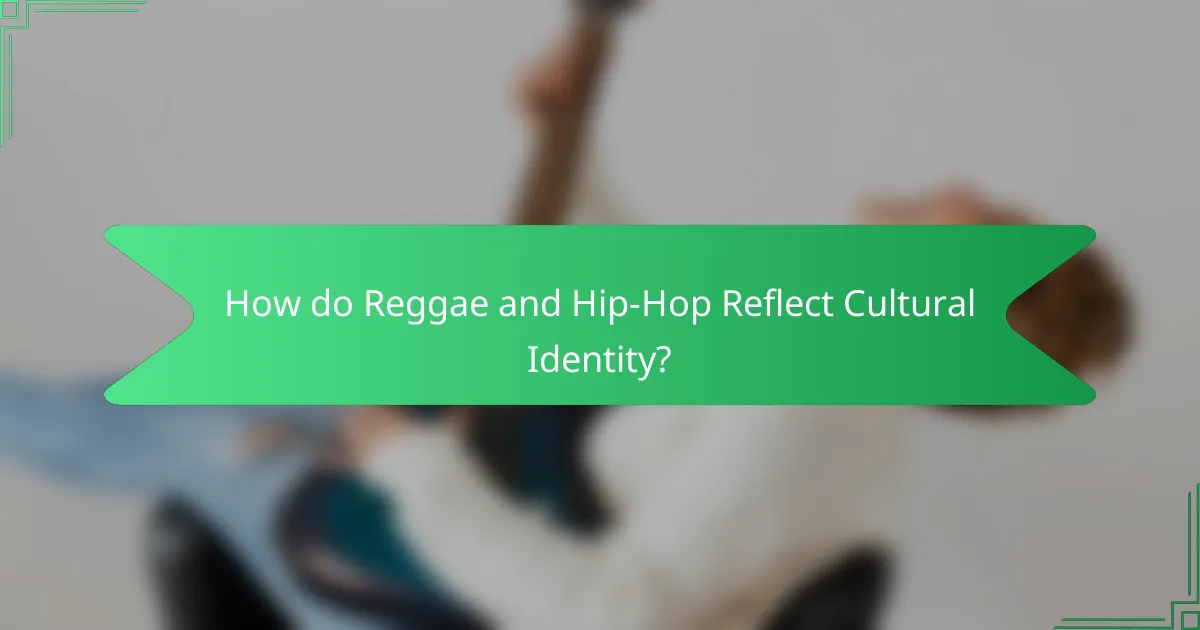
How do Reggae and Hip-Hop Reflect Cultural Identity?
Reggae and hip-hop reflect cultural identity by expressing social issues and personal experiences. Both genres originate from marginalised communities, showcasing resilience and creativity. Reggae often emphasises themes of peace and unity, while hip-hop focuses on empowerment and storytelling. Their fusion creates a rich dialogue, bridging cultural gaps and promoting understanding. This musical interplay highlights the unique attributes of each genre, fostering a global appreciation of diverse cultural narratives.
What are the Historical Connections Between Reggae and Hip-Hop?
Reggae and hip-hop share deep historical connections through cultural exchange and musical influence. Both genres emerged from marginalised communities, using music as a form of expression and resistance.
Reggae, originating in Jamaica during the late 1960s, laid the groundwork for hip-hop’s rhythmic and lyrical styles. The use of syncopated beats and socially conscious lyrics in reggae inspired early hip-hop artists. For instance, DJ Kool Herc, a pioneer of hip-hop, incorporated reggae sound system culture into his parties in the Bronx, blending it with funk and soul.
Moreover, the themes of struggle, identity, and social justice resonate in both genres. Artists like Bob Marley and Tupac Shakur addressed systemic issues, creating a bridge between reggae’s roots and hip-hop’s evolution. This cross-pollination continues today, with contemporary artists frequently sampling reggae tracks or collaborating across genres.
In summary, reggae and hip-hop are intertwined through their cultural origins and shared messages, showcasing the power of music to connect diverse communities.
How Do Lyrics in Reggae and Hip-Hop Address Social Issues?
Lyrics in reggae and hip-hop often highlight social issues, promoting awareness and solidarity. Both genres address themes like poverty, inequality, and injustice, using storytelling to connect with audiences.
Reggae, rooted in Jamaican culture, emphasises resistance against oppression, exemplified by artists like Bob Marley. His song “Get Up, Stand Up” calls for activism and empowerment.
Hip-hop, originating in the Bronx, similarly reflects societal struggles. Artists like Kendrick Lamar use their platform to discuss racism and police brutality. His track “Alright” has become an anthem for the Black Lives Matter movement.
Both genres serve as cultural bridges, fostering dialogue and inspiring change through powerful lyrical messages.
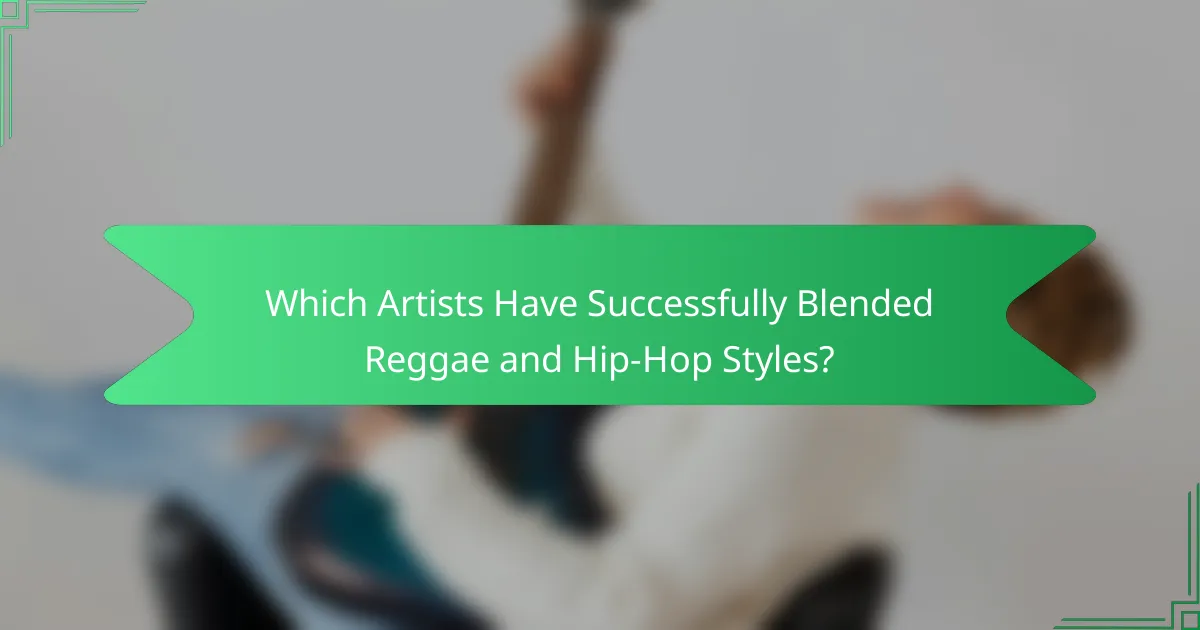
Which Artists Have Successfully Blended Reggae and Hip-Hop Styles?
Artists like Damian Marley, Kid Cudi, and JAY-Z have successfully blended reggae and hip-hop styles. Damian Marley combines reggae rhythms with hip-hop beats, creating a unique sound. Kid Cudi incorporates reggae influences in his melodic approach, while JAY-Z’s collaborations with reggae artists showcase genre fusion. This blending highlights the cultural exchange between reggae and hip-hop, enriching both musical landscapes.
What Unique Elements Do Artists Like Damian Marley and Nas Bring to the Genre?
Damian Marley and Nas uniquely blend reggae and hip-hop through cultural storytelling and social commentary. Marley infuses traditional reggae rhythms with modern beats, emphasising themes of resistance and heritage. Nas, known for his lyrical prowess, brings introspective narratives that resonate with urban experiences. Their collaborations showcase a seamless fusion, bridging genres and promoting unity. This synergy highlights the power of music to transcend cultural boundaries, creating a rich tapestry that reflects diverse influences and shared human experiences.
How Have Collaborations Influenced the Evolution of Both Genres?
Collaborations have significantly shaped the evolution of reggae and hip-hop, fostering cultural exchange and innovation. Artists from both genres have merged styles, creating unique sounds that resonate globally. Notable collaborations, such as those between reggae legends and hip-hop icons, have introduced reggae rhythms into hip-hop tracks, enhancing both genres’ appeal. This blending has led to the emergence of sub-genres, reflecting diverse cultural influences and expanding their audiences. The cross-pollination of ideas and sounds continues to drive creativity and relevance in contemporary music.
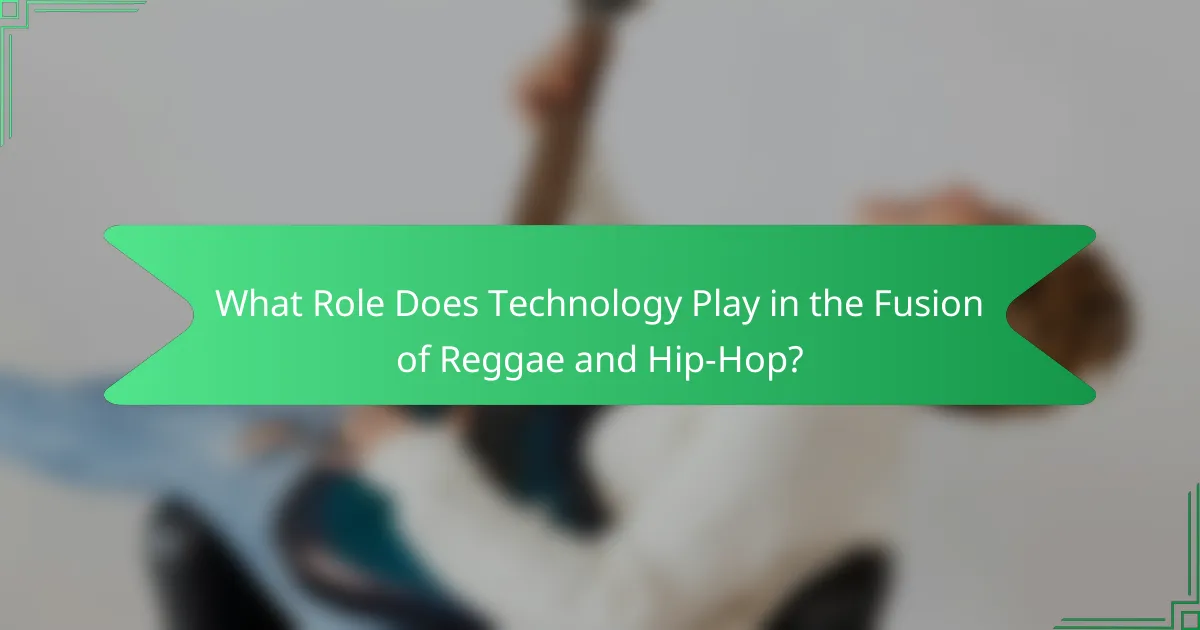
What Role Does Technology Play in the Fusion of Reggae and Hip-Hop?
Technology plays a crucial role in blending reggae and hip-hop by facilitating collaboration and distribution. Digital platforms enable artists to share their music globally, reaching diverse audiences. The use of production software allows for innovative sound experimentation, merging traditional reggae rhythms with hip-hop beats. Streaming services and social media amplify this fusion, creating a vibrant community around these genres. As a result, technology not only enhances creativity but also strengthens cultural connections between reggae and hip-hop artists.
How Are Streaming Platforms Shaping the Accessibility of Reggae and Hip-Hop?
Streaming platforms significantly enhance the accessibility of reggae and hip-hop, allowing global audiences to connect with these genres. They provide a vast library of music, enabling users to discover artists from various backgrounds. This democratization of music fosters cultural exchange and encourages collaboration among diverse musicians. As a result, reggae and hip-hop are no longer confined to their geographic origins but reach listeners worldwide, promoting inclusivity and appreciation for different cultures. Streaming services also utilise algorithms to recommend tracks, further broadening exposure to these vibrant musical forms.
What Innovative Production Techniques Are Common in Both Genres?
Reggae and hip-hop share innovative production techniques that enhance their unique sounds. Both genres frequently utilise sampling, allowing artists to incorporate diverse musical influences. Additionally, they often employ digital audio workstations for editing and mixing, which streamlines the production process. Live instrumentation is another common technique, adding depth and authenticity to tracks. Collaborations between artists from both genres also foster creative experimentation, leading to new sounds and styles.
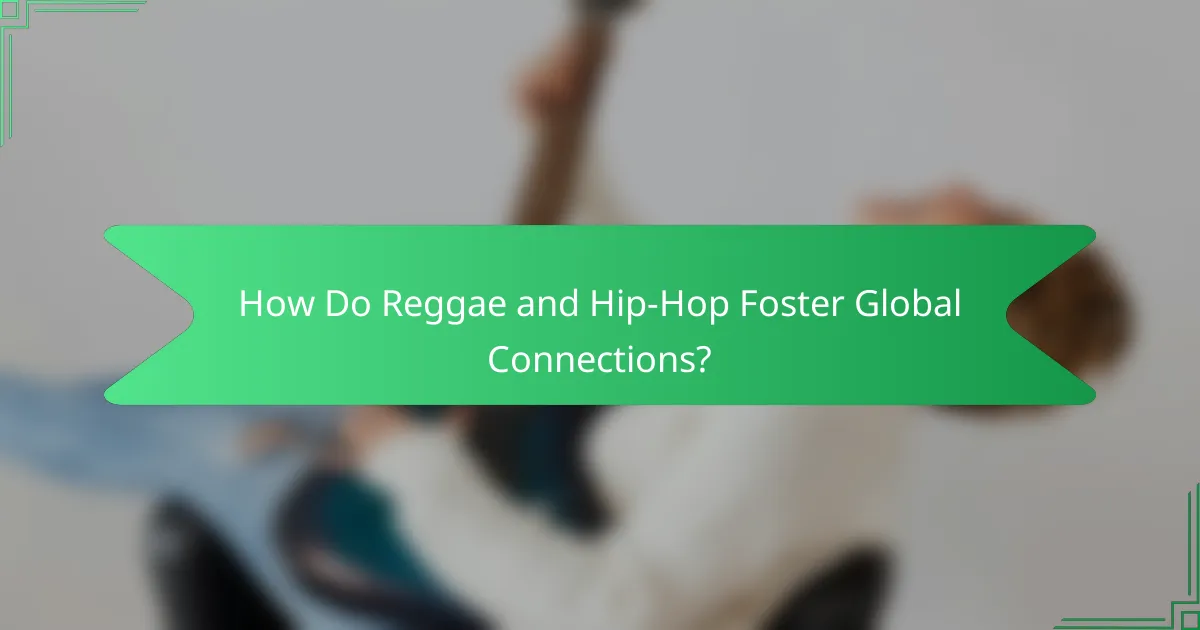
How Do Reggae and Hip-Hop Foster Global Connections?
Reggae and hip-hop foster global connections by promoting cultural exchange and social awareness. Both genres originate from marginalised communities, expressing struggles and resilience through music. They encourage collaboration across borders, blending diverse musical styles and languages. This fusion enhances the global appeal and accessibility of the messages conveyed. As a result, reggae and hip-hop unite people, transcending geographical and cultural barriers.
Which Cultural Events Celebrate the Intersection of Reggae and Hip-Hop?
Several cultural events celebrate the fusion of reggae and hip-hop music. These events showcase artists from both genres, highlighting their shared roots and influences. Examples include the Reggae Sumfest, which often features hip-hop artists, and the annual One Love Festival, celebrating both musical styles. Additionally, the Brooklyn Hip-Hop Festival has included reggae acts, emphasizing the connection between the two genres. These events foster collaboration and cultural exchange, enriching both music scenes.
What Impact Do Reggae and Hip-Hop Festivals Have on Local Communities?
Reggae and hip-hop festivals positively impact local communities by promoting cultural exchange and economic growth. These events foster social cohesion, bringing together diverse groups through shared musical experiences.
Local businesses benefit significantly, as festivals attract tourists who spend on accommodations, food, and merchandise. For example, a study found that a reggae festival increased local revenue by 30%.
Additionally, these festivals often support community initiatives, such as youth programs and local artists, enhancing community pride and engagement. They provide a platform for cultural expression, showcasing unique local talent and traditions.
In summary, reggae and hip-hop festivals strengthen community ties while contributing to economic vitality and cultural enrichment.
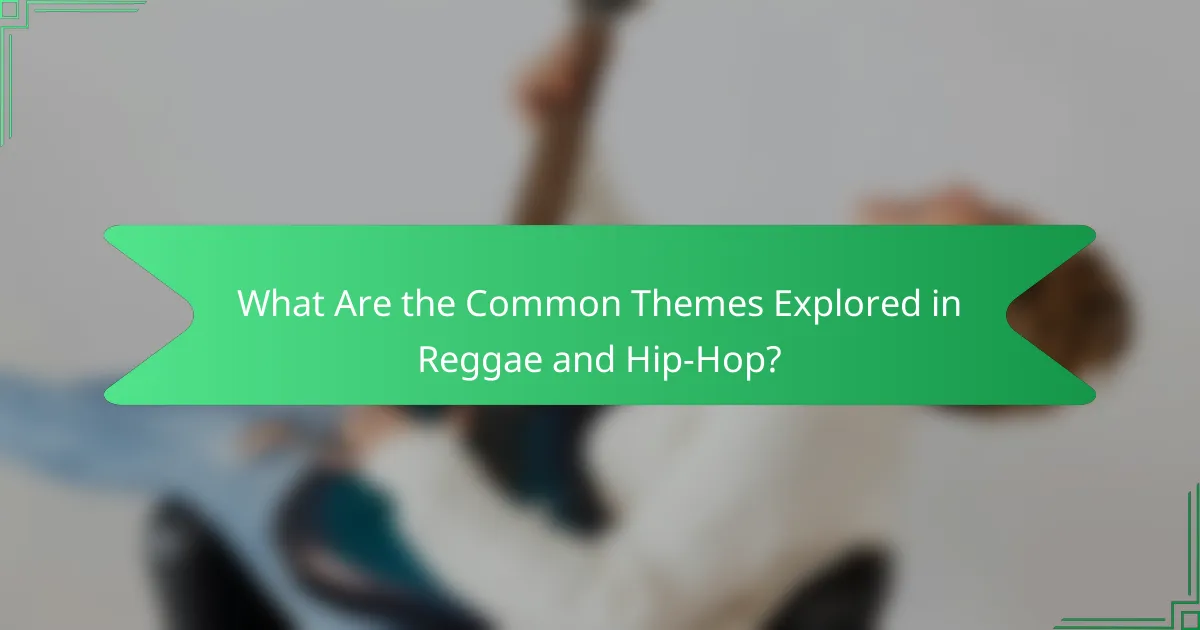
What Are the Common Themes Explored in Reggae and Hip-Hop?
Reggae and hip-hop frequently explore themes of resistance, identity, and social justice. Both genres serve as platforms for marginalised voices, addressing issues like poverty, racism, and systemic oppression.
Reggae often emphasises spirituality and community, reflecting its roots in Rastafarian culture. Hip-hop, on the other hand, highlights personal narratives and urban life experiences.
Both genres utilise storytelling to connect with listeners, fostering a sense of unity and cultural pride. Collaborations between artists from both genres further bridge cultural gaps, promoting mutual understanding and respect.
The fusion of reggae and hip-hop creates a rich tapestry of sound and message, reinforcing their shared values of empowerment and resilience.
How Do Both Genres Address Themes of Resistance and Empowerment?
Reggae and hip-hop both emphasize themes of resistance and empowerment through their lyrics and cultural roots. Reggae often reflects struggles against oppression, focusing on social justice and unity, while hip-hop addresses systemic inequalities and personal empowerment.
Both genres use storytelling to convey messages of resilience. Reggae artists like Bob Marley highlight the fight for freedom and equality, using music as a tool for activism. In contrast, hip-hop artists such as Kendrick Lamar articulate personal and communal experiences of adversity, inspiring listeners to challenge societal norms.
The unique attribute of reggae lies in its spiritual and communal aspects, often invoking Rastafarian themes. Hip-hop, with its roots in urban culture, showcases a rare blend of personal narrative and social commentary, making it a powerful medium for self-expression.
Together, these genres bridge cultural divides, fostering a sense of solidarity and encouraging listeners to embrace their identities while challenging the status quo.
Which Rare Collaborations Highlight Unique Cultural Narratives?
Collaborations between reggae and hip-hop artists showcase unique cultural narratives that emphasize unity and social commentary. Notable examples include the partnership of Damian Marley and Nas in “Distant Relatives,” which explores themes of heritage and resilience. Another example is the collaboration between Sean Paul and Snoop Dogg, blending distinct styles while addressing shared cultural experiences. These collaborations not only highlight musical fusion but also reflect the artists’ commitment to conveying powerful messages through their lyrics.
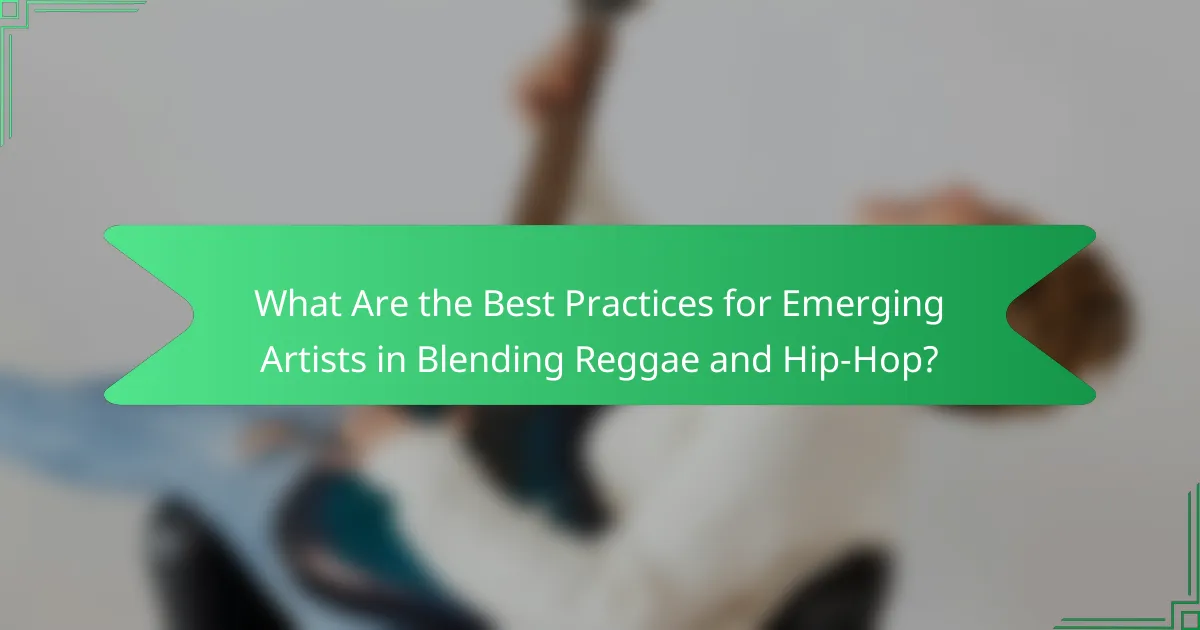
What Are the Best Practices for Emerging Artists in Blending Reggae and Hip-Hop?
Emerging artists blending reggae and hip-hop should focus on authenticity, collaboration, and cultural respect. Authenticity ensures the music reflects personal experiences and backgrounds. Collaborating with established artists can enhance exposure and credibility. Respecting the cultural roots of both genres fosters genuine connections with audiences. Engaging with fans through social media and live performances helps build a loyal following. Experimenting with sounds while maintaining core elements of both genres can lead to innovative music that resonates widely.
Which Strategies Can Artists Use to Maintain Authenticity in Their Music?
Artists can maintain authenticity in their music by staying true to their cultural roots and personal experiences. They should prioritize genuine storytelling, ensuring their lyrics reflect their realities. Collaboration with artists from their cultural background can enhance authenticity while bridging genres like reggae and hip-hop. Additionally, engaging with their audience through social media can foster a sense of community and connection. Lastly, continuous self-reflection and adaptation to personal growth will help artists remain authentic in an evolving industry.
What Common Mistakes Should Artists Avoid When Fusing Genres?
Artists should avoid blending reggae and hip-hop without understanding their cultural roots. Misrepresenting either genre can alienate audiences and dilute authenticity. Focus on respecting the unique attributes of each style while finding common ground. Collaboration with artists from both genres enhances creativity and fosters genuine fusion.
